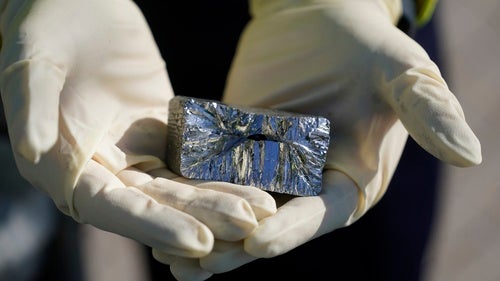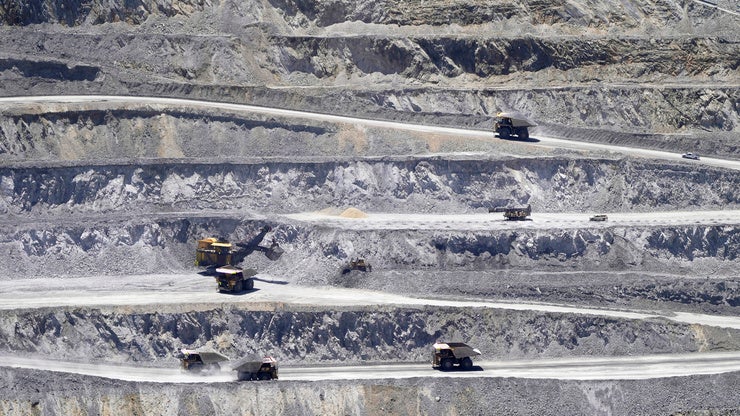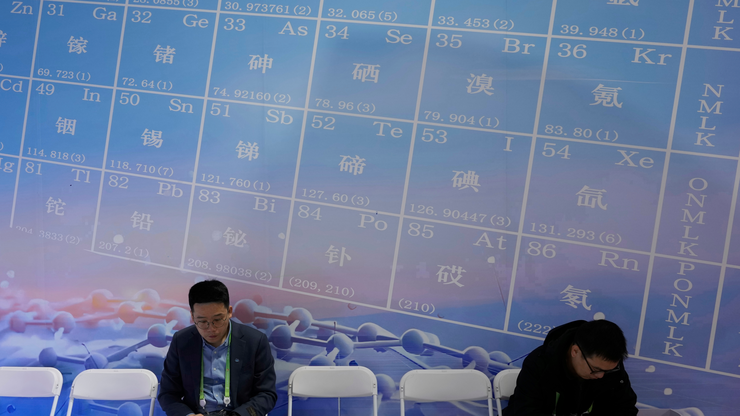Can the US Reduce its Dependence on China for Critical Minerals?

Critical minerals are central to innovation and security. The United States is dependent on China for them. Karl Friedhoff explains why that is becoming a problem.
China has a near-monopoly over critical mineral processing. As Washington seeks to de-risk from Beijing and secure the materials that underpin clean energy and defense technologies, the question is no longer whether, but how, the US will make the transition. Marshall M. Bouton Fellow for Asia Studies Karl Friedhoff explains what is at stake and how the geopolitics of critical minerals are reshaping global supply chains.
This interview has been lightly edited for length and clarity.
What exactly are critical minerals and rare earth elements, and why are they so essential to modern technology?
The United States has designated more than 50 elements and substances as critical minerals. They do this using a methodology that looks at supply, demand, importance to the US economy, and the likelihood of supply disruption. The things on that list are going to run from the more familiar things—like copper and lithium—to the more obscure like neodymium, which is then used for powerful rare earth magnets that go into things like electric vehicle motors and high-end microphones.
What is more important is not what is on the list but how these things are produced. It's not a case of just pulling these minerals and substances out of the ground and then plugging them directly into something like your phone. They have to go through a process of refinement: They're separated out; they're concentrated, and then they become usable in goods. The process is chemically complex. It is resource intensive, putting stress on already stressed infrastructure in places like electricity and water. It can also be environmentally damaging.
How do these materials show up in our daily lives? What kinds of products or systems depend on them most?
The way that most people are going to interact with critical minerals is going to be through the now ubiquitous lithium-ion battery. Lithium comes from various places around the world, primarily Australia and South America. It powers electric vehicles, phones, and even AirPods.
Critical minerals and rare earth elements are also used in defense, for example in the F-35 fighter. We're also going to find them in submarines, and they’re going to go into advanced radar and sonar arrays. They are small elements that are going into larger products. That's why they're called critical—missing small amounts can slow down the process because there is no real replacement for them. If the supply dries up and the production is not there, then the US can no longer produce the things needed for national defense, for automobiles, for phones, and a range of things like that.
How dependent is the United States on China for critical minerals, and why has that become such a strategic risk?
China controls between 50% and 95% of the processing, depending on the element or mineral. For a long time, the United States and its allies and partners around the world were happy to let China take on this work because of the cost, the timeline, and the potential environmental damage.
What we've seen is that China is willing to use its control of these supply chains as leverage. The earliest example is 2010, where it cut Japan off. That really started to awaken the United States and its allies and partners.
"What we've seen is that China is willing to use its control of these supply chains as leverage."
The most obvious implication is the conflict over Taiwan. China could say, we're in a conflict scenario and revoke access to critical minerals and essentially shut down the US manufacturing of certain defense goods. That would give it a major advantage because the US might have a stockpile, but once that stockpile is depleted, it can no longer manufacture new goods. That's perhaps the most extreme scenario.
A more realistic scenario is where China uses its leverage on the US automotive industry. This happened during the most recent trade tensions between the US and China, where China started to restrict the flow of specific elements and minerals into the United States. There were quotes from US auto executives saying that within three weeks, the US automotive industry would have to shut down because they were running out of supply.
It gives China a lot of leverage about what they're going to restrict and when they're going to restrict it—and it allows them to affect American industries and American jobs.
How do these materials connect to the clean energy transition and to US national security?
Critical minerals and rare earth elements are underpinning the entire clean energy transition around the world. Whether that's electric vehicles and the powerful magnets that go into their motors, or the lithium-ion batteries that go into solar panels and wind turbines. There's a real scramble to secure as many of these as possible because many countries around the world want to make that energy transition and wean themselves off fossil fuels.
The United States has taken a very curious approach under the Trump administration in that not only are they trying to secure critical minerals and rare earth elements, but they're moving away from the clean energy transition. They are undermining sales of electric vehicles. They are saying that wind turbines should not be built, and that battery storage should not be relied upon.
"The clean energy transition is a battle for the technology of the future."
The clean energy transition is a battle for the technology of the future. By undermining these clean energy transition tools—electric vehicles, solar panels, wind turbines—the United States is no longer going to be competing at the technological forefront and is essentially ceding that ground to China.
Looking ahead, what would a successful long-term strategy entail when it comes to critical minerals and rare earth elements?
The first thing the United States needs to do is prioritize the midstream, and that's the processing and refining piece. So far, the Trump administration has focused on access to the minerals themselves. They've signed deals with Ukraine. They've opened federal lands to increase mining. They're trying to streamline the permitting process to bring in more raw minerals in a much quicker fashion. That doesn't solve the challenge because without control of the midstream, we have the raw minerals, but we still have to send them to China to be processed.
To combat this, the US needs to set up more processing plants and refineries around the United States and Canada. We've seen some of our allies and partners start to do this but the timelines for building these is not short and the expense is not small. We're looking at, on average, around $500 million to set up a refinery. That's for something like rare earth elements. And it comes with a whole host of problems, especially on the environmental side.
If we're going to do this, it needs to start now, and there needs to be a major outlay of funding to even begin to approach something that's going to look like a secure and safe supply chain.
Related Content



